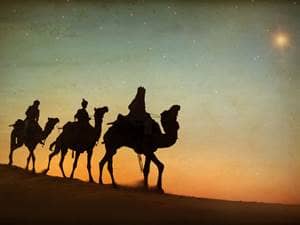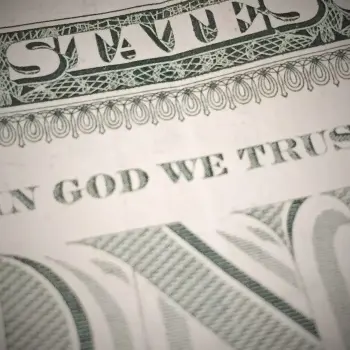
And so, the third season in the Church calendar, Epiphanytide, has just passed. Did you notice? Anyone who saw House of Cards will know too well that a great first and second season doesn’t always lock in a spectacular third, and such is Epiphany: the season which, after the dregs of holiday spirit are drained, commands all the comparative wonderment of a stale cornflake.
Nearly synonymous with January, the season of Epiphany follows two tough acts in the form of its immediate predecessors, Lord Advent and Lady Christmastide. So far so dismal; but wait! Even the month of looming overdrafts is fertile ground for the growth of our souls, if not of our credit ratings. Riches in heaven, people! Maybe, then, Epiphany deserves a second look.
I recall the moment I learned the word ‘epiphany’. Sadly, the younger Matthew did not happen upon this term in a great work of literature but in a source more lowbrow: The Simpsons Movie, which arrived in cinemas when I was about seven. Homer inquires of an Eskimo lady while stranded in Alaska, ‘What’s an epiphany?’ She gives a pithy definition, one which I’m sure was thenceforth entered in dictionaries everywhere: ‘Sudden realisation of great truth.’
Epiphany with a capital ‘E’ takes place on 6th January to remember the night when the Three Wise Men did homage in Bethlehem to Christ – a night of ‘sudden realisation,’ indeed. It’s a narrative that we believers do well to revisit as another year dawns because it grapples with no less a theme than the search for God, a topic sometimes discussed in the Christian Church.
It seems to me that if one wishes to find God, then one might do worse than to read about someone who has already tracked him down – or, what’s better, three who have done so. Maybe their success is repeatable in our time? I think it is. What I have in mind, though, does not involve a pilgrimage across the Near East with telescope in hand, so put asunder thy star charts!
Rather, I propose – as I’m sure others have – to spin the Three Wise Men story (Matthew’s Gospel, 2nd Chapter) as an allegory for the life of a Christian. There are within it, should we choose to see them, symbols which call to mind religious practices. Collectively, these Christian traditions, upheld for centuries by the Church, are pointers to God. Shall we take a look?
‘For we have seen his star in the East, and have come to worship him’ (v. 2b). A star is white and round. What else is white and round? Yes, a wafer of eucharistic host is white and round! As it happens, most Roman Catholic, Lutheran and Anglican churches are constructed in such a way that we kneel down ad orientem, facing eastwards, to receive the Blessed Sacrament.
When the priest raises the host over the chalice, just as God raised the star over the stable in Bethlehem, we the Faithful are invited to come before Christ and worship, like the Wise Men did. Allow me to splice together, as a way to point up the parallels between Eucharist and Epiphany, lines from the communion anamnesis with lyrics from “We Three Kings’:
We remember his passion and death: Myrrh is mine; its bitter perfume / Breathes a life of gathering gloom; / Sorrowing, sighing, / Bleeding, dying, / Sealed in the stone-cold tomb.
We celebrate his resurrection and ascension: Frankincense to offer have I, / Incense owns a Deity nigh: / Prayer and praising / All men raising, / Worship him God on high.
And we look for the coming of his kingdom: Born a King on Bethlehem plain, / Gold I bring to crown him again, / King for ever, / Ceasing never / Over us all to reign.
Epiphany, therefore, helps identify – quite subtly, through clever symbolism – the crucial themes in the life of Christ, ideas that subsequent events in the Church’s calendar will develop: (1) his passion and death; (2) his resurrection and ascension; and (3) the coming of his kingdom.
These marvels are not an exhaustive list of all Jesus did while on earth; as John’s Gospel puts it, ‘Jesus did many other things as well. If every one of them were written down, I suppose that even the whole world would not have room for the books that would be written’ (21.25, NIV).
‘…for so it is written by the prophet’ (v. 5b). Alongside the sacraments, Holy Scripture illumines our steps as we grasp our way towards the Kingdom of Heaven. ‘Thy word is a lamp unto my feet,’ writes the Psalmist, ‘and a light unto my path’ (119.105). Prophecy leads the Wise Men to the correct vicinity; then a special sign, the Star of Bethlehem, pinpoints their destination.
In Anglicanism, high church types often privilege the Sacraments over the Scriptures, and low church types often privilege the Scriptures over the Sacraments. Really, though, believers need healthy doses of each in order to grow; the Bible mustn’t embarrass high church folk, and the Mysteries mustn’t embarrass low church folk.
‘Then, opening their treasures, they offered him gifts, gold and frankincense and myrrh’ (v. 11b). If you were at a service of lessons and carols over the holidays, then you probably sang “In the Bleak Midwinter,” a great British hymn with words by Christina Rosetti and music by Gustav Holst. You’ll remember the closing line, ‘Yet what I can I give Him, / Give my heart.’ Anglicans have a line in our Holy Communion Order, found in the Post Communion prayer, which encapsulates the same idea: ‘We offer you our souls and bodies to be a living sacrifice.’
‘And being warned in a dream not to return to Herod, they departed to their own country by another way’ (v. 12). Perhaps this is reaching a bit, not least because the Wise Men did nothing wrong by their initial trip to see Herod, but we could read their decision to choose a new path as an allegory for the practise of repentance. For Catholics, repentance (plus confession, absolution and penance) carries all the grace of a sacrament. Regardless of denominational views, repentance is a vital part of sanctification for all Christians, whereby God readies us for eternity.
Shall we sum up, then? Don’t write off Epiphany just because the holidays are over. Join the Three Wise Men this January for another trip to Bethlehem, where we may learn and relearn the rhythms of life in Christ. As another year beckons, let yourself linger for a while beside the Holy Child before he grows up into the Prophet, Priest and King that he was destined to become.
1/15/2024 7:28:23 AM





